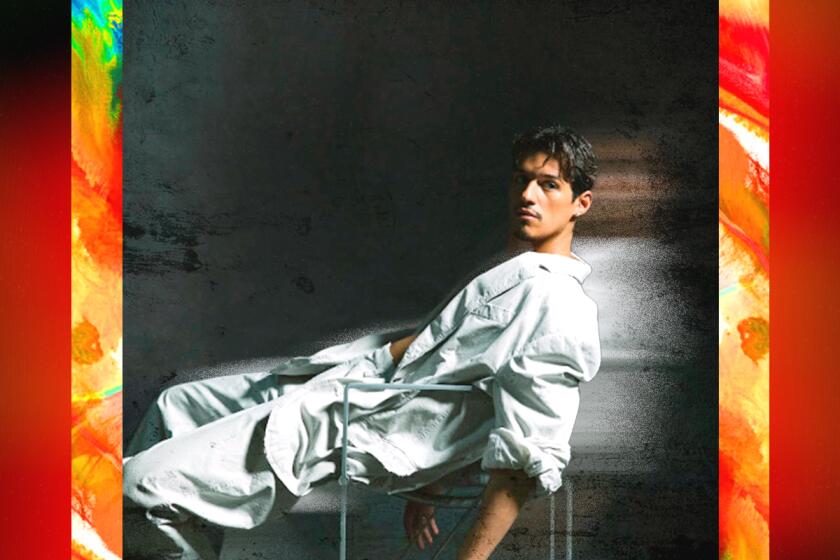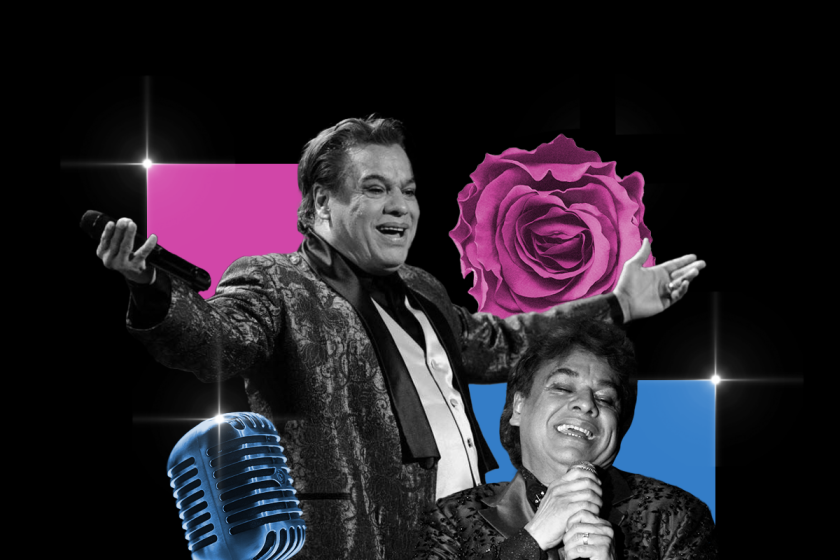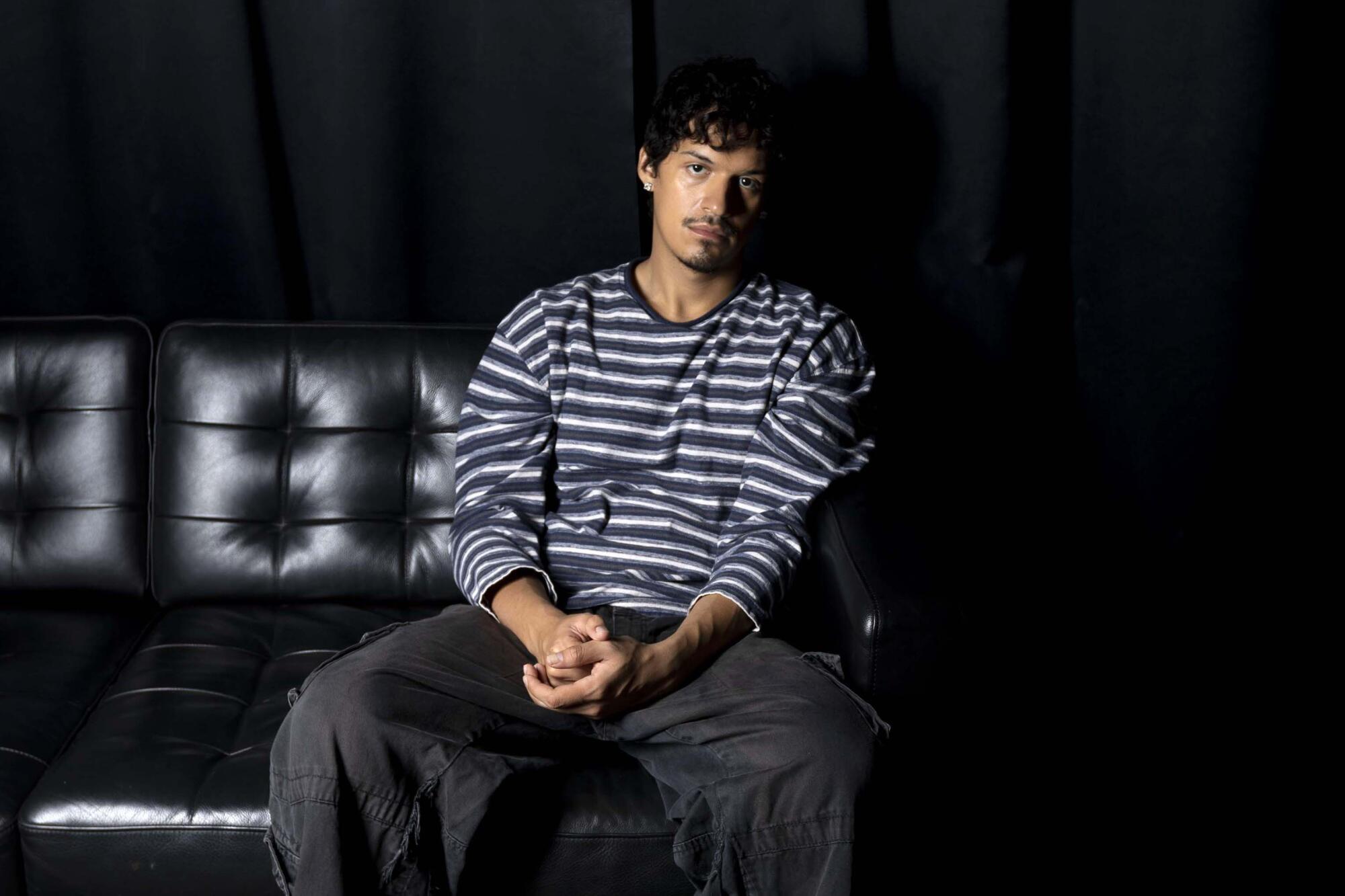
Omar Apollo is in a back room at a soundstage in Van Nuys, taking a break from filming the music video for “Done With You,” a track off his sophomore album, “God Said No,” released June 28 via Warner Records. Dressed in a neutral-colored striped shirt and baggy jeans, he leans back in a chair and stretches his arms behind his head. A pair of sparkling diamond studs adorn his ears.
“To describe this era, it’s pretty glamorous,” Apollo said.
Mexican American singer Omar Apollo announced his world tour ahead of the release of ‘God Said No,’ his much anticipated sophomore album.
Following his first Grammy nomination last year for his debut album, “Ivory,” Apollo has outwardly lived a charmed life. He’s modeled for fashion campaigns and attended Paris Fashion Week. In May, Apollo walked the cream- and moss-colored carpet at the Met Gala, wearing an outfit he described as being based on “just vibes.” His presence at the exclusive event sparked a somewhat viral moment after Apollo posted a video on X that showed his father running inside the family home in Hobart, Ind., toward the living room after being told his son was on the television screen. On the wall above the TV set, we see a crucifix sandwiched by two platinum song plaques. The video has been viewed more than 3.8 million times.
“My parents are such a big part of my life,” Apollo said. “I love them so much. When people would call me genuine, I feel like they’re just complimenting my parents because I get everything good from them.”
Apollo’s self-proclaimed glamour era has also taken the singer to the world of high art. Last October, Apollo hosted an immersive listening experience at MoMA PS1 for “Live for Me,” an EP that delves into his coming-out experience. On display at the ticketed event were two nude paintings of Apollo done by queer artist Doron Langberg — they doubled as the front and back covers of the EP.
Omar Apollo’s latest single ‘Ice Slippin’ reflects on the frosty reception he received when he came out to his family.
Over the years, Apollo has owned his queerness in public as his career has progressed. Though his music has always hinted at his sexual orientation — when asked by The Times four years ago how he identified, Apollo said, “I’m just chilling” — it wasn’t until 2022 that he sang frankly about being in love with another man. The song, “Evergreen (You Didn’t Deserve Me at All),” also happened to be his biggest hit to date, peaking at No. 51 on the Billboard Hot 100 chart.
“It made me trust my intuition more,” he said of the song’s success. Since then, Apollo has been more open about who he is and what inspires him.
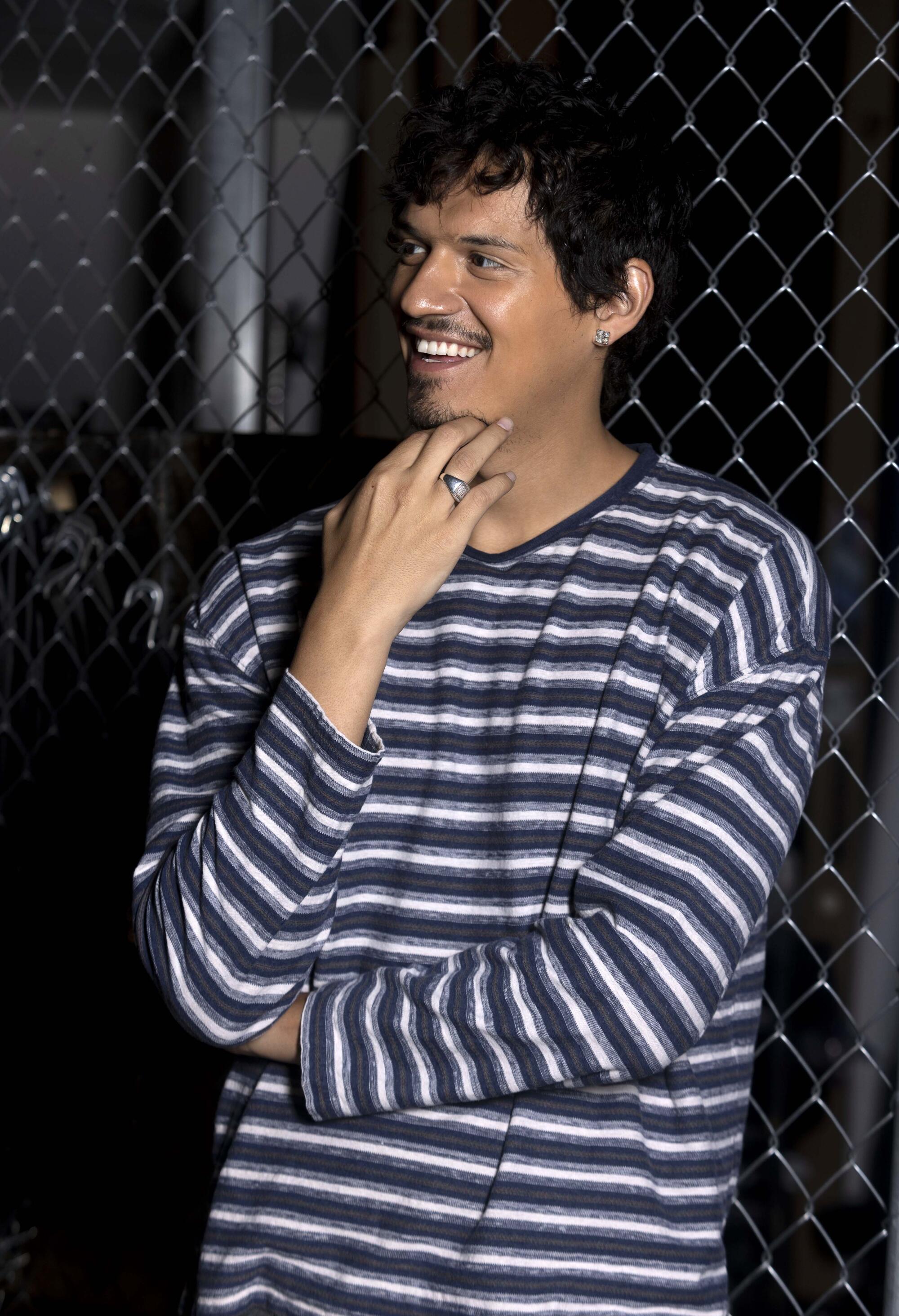
“I’m super into Peter Hujar, David Wojnarowicz, all these photographers from the ’80s during the AIDS epidemic. I think nudity is beautiful,” Apollo said, adding that the Langberg paintings were inspired by a Hujar photograph in which the subject is masturbating.
“It was a dope experience. I wanted to do it for myself,” he said. “It was a crazy year for me. Being 26 was something I wanted to remember.”
Much like the paintings, “God Said No” captures a portion of Apollo’s life at that age (he turned 27 in May). The album was recorded while he was going through a breakup, chronicling the dissolution of that relationship in real time. In the hi-NRG rush of “Less of You,” Apollo sings about his ex becoming distant. In the soulful funk of “Done With You,” his voice flutters as he struggles to move on. The title of the LP doubles as an acknowledgment that it wasn’t meant to be — Apollo shared that it came from a conversation he had in the studio with a friend after opening up about his situation.
“My friend was like, ‘God said no to you,’” Apollo recalled. “I was like, ‘Wow, that really ties the album together.’ After every song, you can say, ‘God said no.’ I believe in a higher, divine power and I believe that sometimes you have to accept a colossal loss.”
‘Mi Divo’ podcast host Maria Garcia examines her own identity and trauma through Juan Gabriel’s story
In “Mi Divo,” Apple TV+’s first dual-language podcast, host Maria Garcia weaves personal narrative with the story of the singer Juan Gabriel.
Leaning into his bilingual upbringing, Apollo also processed the grief of his breakup in Spanglish. Though much of his music is in English, he’s flaunted his Mexicanidad here and there. In his 2020 mixtape “Apolonio,” Apollo showed off his corrido chops with “Dos Uno Nueve (219),” a braggadocious ode to his hometown (the number refers to the area code for northwest Indiana). In “Ivory,” he channeled his inner Juan Gabriel in the haunting “En el Olvido.” In “God Said No,” Spanish is tucked away in the heartbreaking ballad “Empty.” Halfway through the song, Apollo sings, “Cantando en otro lenguaje pa’ que no me entiendes / No quiero que sepas cuánto me duele” (I’m singing in another language so you don’t understand me / I don’t want you to know how much I’m hurting).
“In that song in particular I was exhausted with love,” he said.
“I was exhausted writing about the same situation, the same person, love in general. I was just so sick of it. I was sick of it being understood and I was like, ‘Well, he doesn’t speak Spanish, so let me just write this in Spanish.’ It made sense. That felt authentic and genuine for me. It felt so right.”
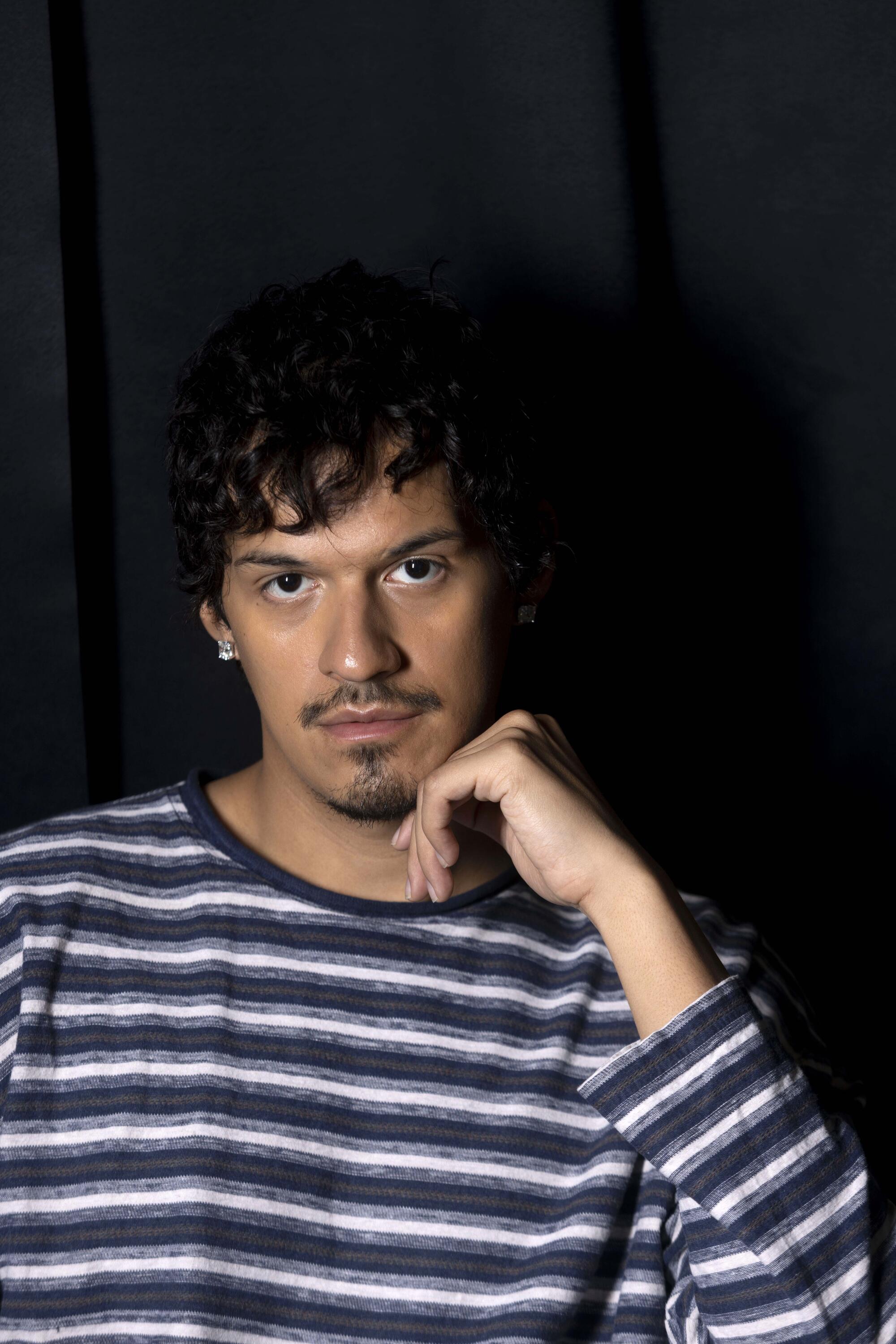
One of the people Apollo leaned on while making the album was Pedro Pascal. The Chilean American actor even makes a cameo on the album — he contributed to the interlude “Pedro,” opening up about a moment of grief in his life. While bonding in the recording studio, Apollo said, he discussed with Pascal the possibility of getting into acting in the future.
“That would be cool. I’ll do it! I’ve been friends with him for a while now,” Apollo said.
“He was present during the whole process of me making that album. We got along so well. We have a great friendship. I only really like to work with my friends. [Sudanese Canadian poet] Mustafa’s the only other feature on this album. He’s my best friend. I just keep it in the circle.”
Next week, Apollo will embark on an ambitious world tour in promotion of “God Said No,” kicking it off in Australia and making a stop at the Hollywood Bowl on Oct. 5. If 26 was spent in the studio, 27 will be spent in front of his fans — something he appears to relish. He describes feeling joy at a listening party for “God Said No” held the night before this interview.
“There were a lot of queer Chicano kids, and it just made me so happy,” he said with a smile, recalling one fan encounter in particular.
“This kid had me as his phone background. He wanted to take a picture with me, and then he covered his phone with his hand. I was like, ‘You don’t have to cover it. It’s cool. You’re safe here.’ It was so cute because I used to have the people I love as my background. It’s so sweet that I can be some type of source of light for the queer community, especially in the Latino community.”
Lucas Villa is a Mexican American journalist who covers pop and Latin music. He’s written for Allure, Elle, Rolling Stone, Billboard, Paper Magazine, Vibe and LGBTQ Nation.
More to Read
The Latinx experience chronicled
Get the Latinx Files newsletter for stories that capture the multitudes within our communities.
You may occasionally receive promotional content from the Los Angeles Times.

